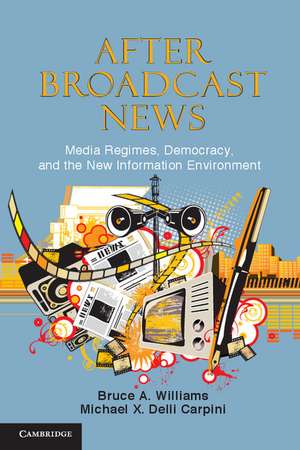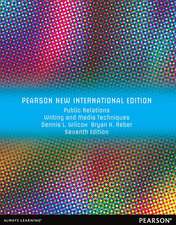After Broadcast News: Media Regimes, Democracy, and the New Information Environment: Communication, Society and Politics
Autor Bruce A. Williams, Michael X. Delli Carpinien Limba Engleză Paperback – 9 oct 2011
| Toate formatele și edițiile | Preț | Express |
|---|---|---|
| Paperback (1) | 273.89 lei 6-8 săpt. | |
| Cambridge University Press – 9 oct 2011 | 273.89 lei 6-8 săpt. | |
| Hardback (1) | 641.80 lei 6-8 săpt. | |
| Cambridge University Press – 25 sep 2011 | 641.80 lei 6-8 săpt. |
Din seria Communication, Society and Politics
-
 Preț: 188.94 lei
Preț: 188.94 lei -
 Preț: 207.35 lei
Preț: 207.35 lei -
 Preț: 177.14 lei
Preț: 177.14 lei -
 Preț: 192.21 lei
Preț: 192.21 lei -
 Preț: 227.23 lei
Preț: 227.23 lei -
 Preț: 388.16 lei
Preț: 388.16 lei -
 Preț: 204.48 lei
Preț: 204.48 lei - 11%
 Preț: 568.81 lei
Preț: 568.81 lei -
 Preț: 173.02 lei
Preț: 173.02 lei -
 Preț: 204.56 lei
Preț: 204.56 lei -
 Preț: 230.51 lei
Preț: 230.51 lei -
 Preț: 209.78 lei
Preț: 209.78 lei -
 Preț: 267.61 lei
Preț: 267.61 lei -
 Preț: 269.58 lei
Preț: 269.58 lei -
 Preț: 269.19 lei
Preț: 269.19 lei -
 Preț: 203.50 lei
Preț: 203.50 lei -
 Preț: 229.74 lei
Preț: 229.74 lei -
 Preț: 206.29 lei
Preț: 206.29 lei -
 Preț: 266.47 lei
Preț: 266.47 lei -
 Preț: 326.70 lei
Preț: 326.70 lei -
 Preț: 252.03 lei
Preț: 252.03 lei -
 Preț: 289.01 lei
Preț: 289.01 lei -
 Preț: 267.61 lei
Preț: 267.61 lei -
 Preț: 226.68 lei
Preț: 226.68 lei - 11%
 Preț: 558.08 lei
Preț: 558.08 lei -
 Preț: 265.70 lei
Preț: 265.70 lei -
 Preț: 288.04 lei
Preț: 288.04 lei -
 Preț: 313.10 lei
Preț: 313.10 lei
Preț: 273.89 lei
Nou
Puncte Express: 411
Preț estimativ în valută:
52.41€ • 54.72$ • 43.28£
52.41€ • 54.72$ • 43.28£
Carte tipărită la comandă
Livrare economică 15-29 aprilie
Preluare comenzi: 021 569.72.76
Specificații
ISBN-13: 9780521279833
ISBN-10: 0521279836
Pagini: 376
Ilustrații: 7 b/w illus. 6 tables
Dimensiuni: 152 x 226 x 23 mm
Greutate: 0.54 kg
Ediția:New.
Editura: Cambridge University Press
Colecția Cambridge University Press
Seria Communication, Society and Politics
Locul publicării:New York, United States
ISBN-10: 0521279836
Pagini: 376
Ilustrații: 7 b/w illus. 6 tables
Dimensiuni: 152 x 226 x 23 mm
Greutate: 0.54 kg
Ediția:New.
Editura: Cambridge University Press
Colecția Cambridge University Press
Seria Communication, Society and Politics
Locul publicării:New York, United States
Cuprins
1. Is there a difference between Tina Fey and Katie Couric?: policing the boundaries between news and entertainment; 2. Media regimes and American democracy; 3. And that's the way it (was): the rise and fall of the age of broadcast news; 4. Political reality, political power and political relevance in the changing media environment; 5. Politics in the emerging new media age: hyperreality, multiaxiality, and 'the Clinton scandals'; 6. When the media really matter: coverage of the environment in a changing media environment; 7. 9/11 and its aftermath: constructing a political spectacle in the new media environment; 8. Shaping a new media regime.
Recenzii
“After Broadcast News does more than any book I know to explain why the old distinctions between news, opinion, and entertainment are breaking down and why these changes are not a catastrophe! Williams and Delli Carpini provide a powerful, critical revisionist history of journalism’s so-called golden era, trimming it down to size as simply the latest – and not necessarily the greatest – ‘media regime’ since the dawn of American democracy. As economic, cultural, and technological forces create the conditions for a new order, the authors present ample evidence of talk show hosts, filmmakers and actors, comedians, musicians, bloggers, and engaged citizens making creative use of media for democratically-useful ends. Journalism will continue to have an important role to play. At the end of the day, though, what’s really important is not who produces politically-relevant discourse, but simply that it is created and disseminated as widely as possible. This book will change the way you see the world. It’s a compelling call to arms to stop fighting the last era’s media battles in order to better direct the changes to come.”
– Rodney Benson, New York University
“An insightful, well written and thoroughly researched analysis of what the rise of entertainment, the internet and digital media mean for the quality of journalism and democracy. While being firmly anchored to the US experience, it is highly relevant for Europe, Asia and elsewhere since we are all engulfed in a similar process of change.”
– James Curran, Goldsmiths, University of London
“Political communication took place for most of the late twentieth century in a media environment dominated by professional journalistic gatekeepers, dedicated to norms of social responsibility, largely insulated from commercial pressures, and at the same time closely tied to established political elites. Over the past couple of decades, this ‘media regime,’ as Williams and Delli Carpini put it, has broken down, and a multitude of hybrid genres and competing gatekeepers with divergent motivations and ideologies have replaced the bounded, unified system of the previous era. We are still sorting out how to understand political communication in this new era, and Williams and Delli Carpini make a sophisticated, lively contribution to accomplishing this. It makes a big difference that they bring to this task a good sense of history, and put the most recent transformation of American political communication in the context of along and complex history of contention over the rules of the game for determining who gets to speak about politics and how.”
– Daniel Hallin, University of California, San Diego
– Rodney Benson, New York University
“An insightful, well written and thoroughly researched analysis of what the rise of entertainment, the internet and digital media mean for the quality of journalism and democracy. While being firmly anchored to the US experience, it is highly relevant for Europe, Asia and elsewhere since we are all engulfed in a similar process of change.”
– James Curran, Goldsmiths, University of London
“Political communication took place for most of the late twentieth century in a media environment dominated by professional journalistic gatekeepers, dedicated to norms of social responsibility, largely insulated from commercial pressures, and at the same time closely tied to established political elites. Over the past couple of decades, this ‘media regime,’ as Williams and Delli Carpini put it, has broken down, and a multitude of hybrid genres and competing gatekeepers with divergent motivations and ideologies have replaced the bounded, unified system of the previous era. We are still sorting out how to understand political communication in this new era, and Williams and Delli Carpini make a sophisticated, lively contribution to accomplishing this. It makes a big difference that they bring to this task a good sense of history, and put the most recent transformation of American political communication in the context of along and complex history of contention over the rules of the game for determining who gets to speak about politics and how.”
– Daniel Hallin, University of California, San Diego
Notă biografică
Descriere
After Broadcast News challenges the role of professional journalists as the primary source of politically relevant information.
















